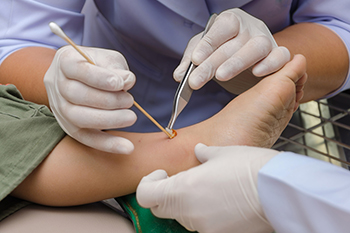
Diabetic foot ulcers are a common complication for people with diabetes. They are caused by issues like peripheral neuropathy, poor circulation, and increased pressure on certain areas of the foot. Neuropathy can reduce sensation in the feet, leading to unnoticed injuries that may worsen or become infected. In addition, reduced blood flow slows the healing process, which further increases the risk of infection. Podiatrists are equipped to assess the severity of diabetic foot ulcers and provide appropriate wound care. This includes removing dead tissue, applying specialized dressings, and offloading pressure from the affected area. In some cases, surgery may be required to support the healing process. Proper care is essential to minimize the risk of serious complications, such as gangrene or amputation. By addressing the specific needs of the foot ulcer, a podiatrist can help promote recovery and reduce further risks. If you have a diabetic foot ulcer, it is suggested that you make an appointment with a podiatrist for wound care options.
Wound care is an important part in dealing with diabetes. If you have diabetes and a foot wound or would like more information about wound care for diabetics, consult with Patrice Antero, DPM from Tuscany Podiatry. Our doctor will assess your condition and provide you with quality foot and ankle treatment.
What Is Wound Care?
Wound care is the practice of taking proper care of a wound. This can range from the smallest to the largest of wounds. While everyone can benefit from proper wound care, it is much more important for diabetics. Diabetics often suffer from poor blood circulation which causes wounds to heal much slower than they would in a non-diabetic.
What Is the Importance of Wound Care?
While it may not seem apparent with small ulcers on the foot, for diabetics, any size ulcer can become infected. Diabetics often also suffer from neuropathy, or nerve loss. This means they might not even feel when they have an ulcer on their foot. If the wound becomes severely infected, amputation may be necessary. Therefore, it is of the upmost importance to properly care for any and all foot wounds.
How to Care for Wounds
The best way to care for foot wounds is to prevent them. For diabetics, this means daily inspections of the feet for any signs of abnormalities or ulcers. It is also recommended to see a podiatrist several times a year for a foot inspection. If you do have an ulcer, run the wound under water to clear dirt from the wound; then apply antibiotic ointment to the wound and cover with a bandage. Bandages should be changed daily and keeping pressure off the wound is smart. It is advised to see a podiatrist, who can keep an eye on it.
If you have any questions, please feel free to contact our office located in Tuscaloosa, AL . We offer the newest diagnostic and treatment technologies for all your foot care needs.



